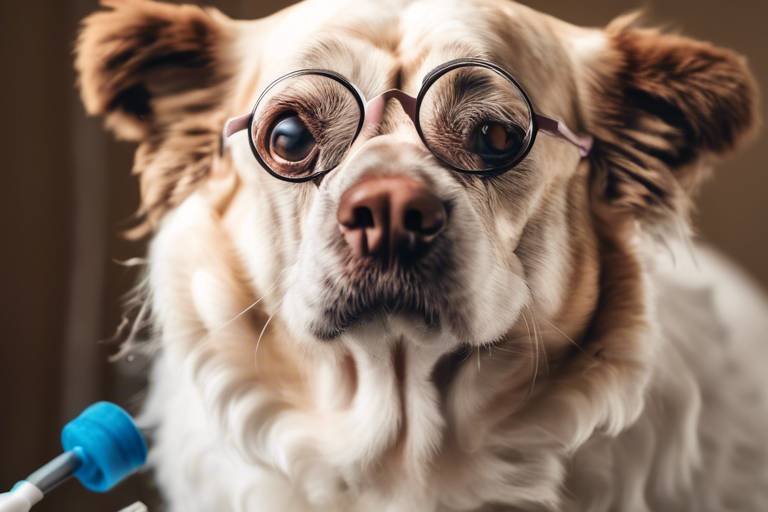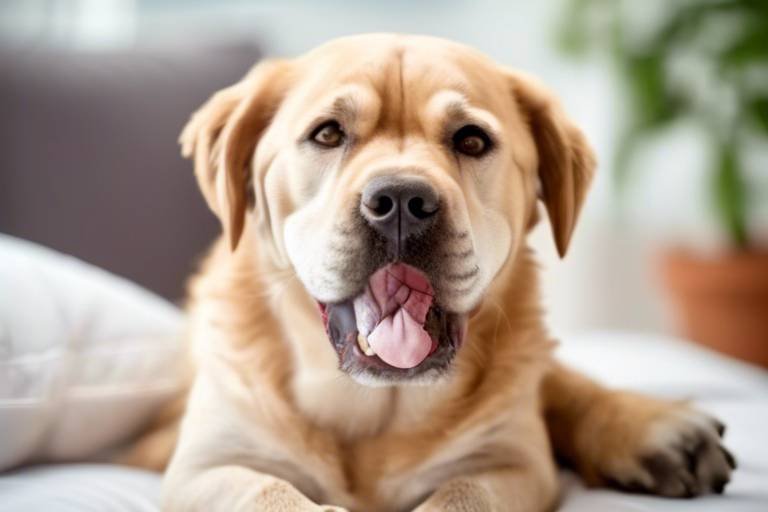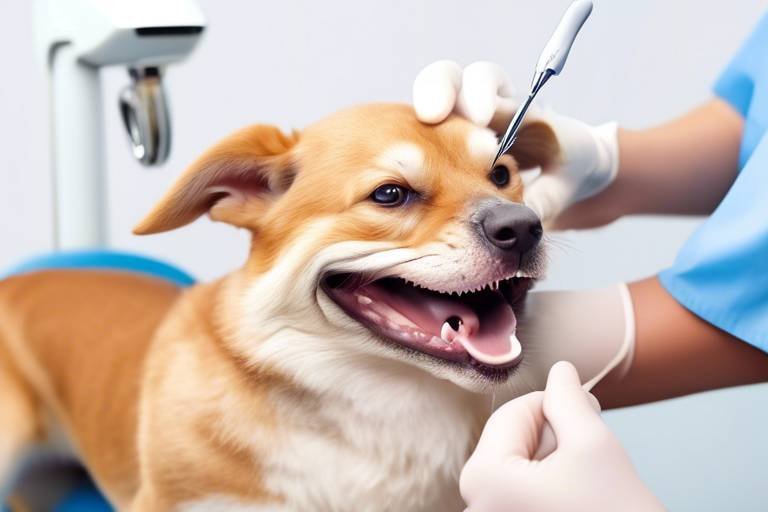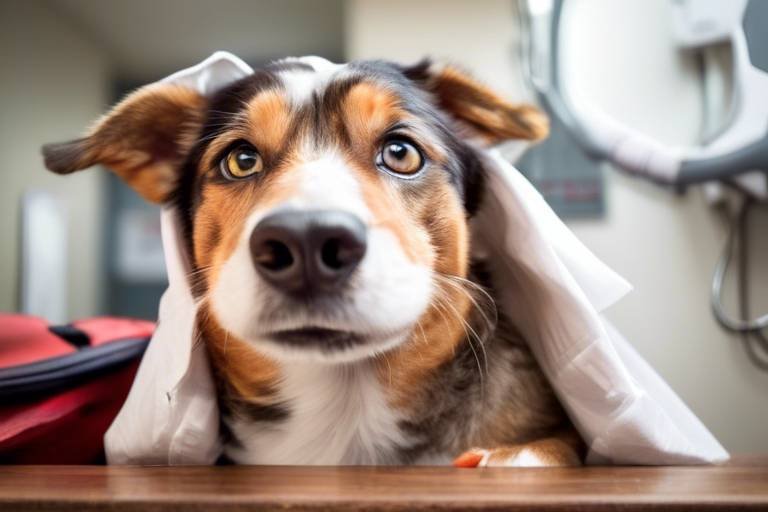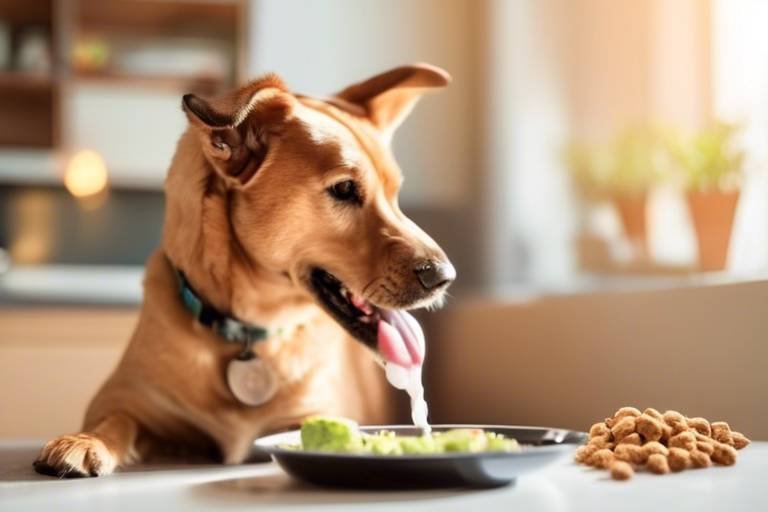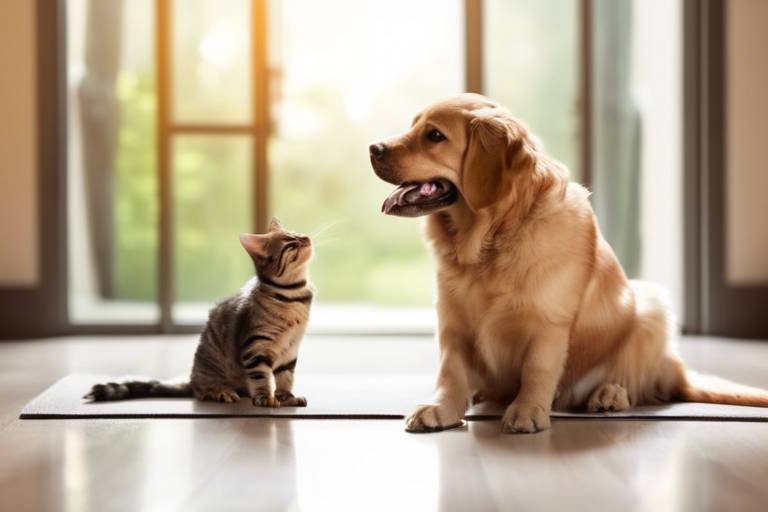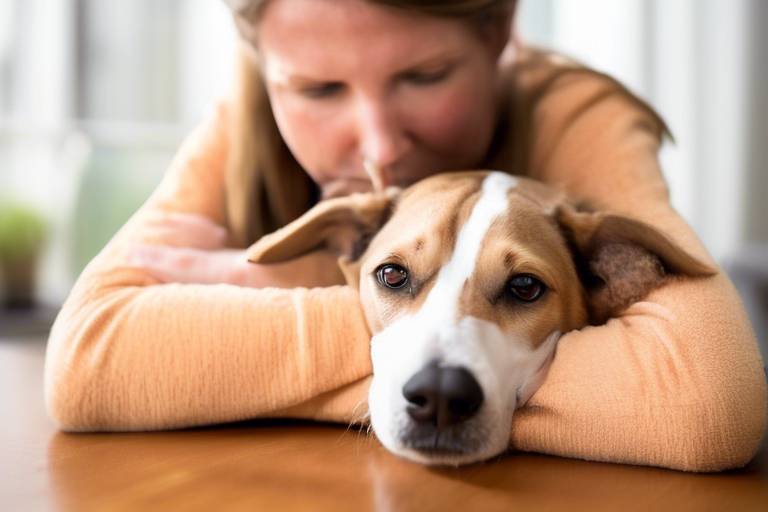The Importance of Regular Physical Check-ups for Senior Pets
As our beloved furry companions grow older, their health needs change significantly, and this is where the importance of regular veterinary check-ups comes into play. Just like humans, senior pets experience a range of physical and emotional changes that can impact their overall well-being. These changes can be subtle, making it easy for pet owners to overlook potential health issues. Regular check-ups are not just about keeping vaccinations up to date; they are a vital part of ensuring your senior pet lives a long, healthy, and fulfilling life.
Consider this: when you visit the doctor for a routine check-up, it’s often to catch potential problems before they escalate. The same principle applies to our pets. Regular veterinary visits provide an opportunity to monitor your pet's health, catch any emerging issues early, and develop a comprehensive care plan tailored to their specific needs. This proactive approach can make a world of difference in managing health problems that are common in senior pets, such as arthritis, diabetes, and kidney disease.
Moreover, these check-ups allow veterinarians to conduct essential screenings and tests that can identify underlying health conditions. For instance, blood tests can reveal organ function, while physical examinations can detect signs of pain or discomfort that might not be immediately apparent. By addressing these issues early, you can help your pet maintain a better quality of life, ensuring they stay active and engaged in their golden years.
In addition to medical evaluations, regular check-ups also provide an opportunity for pet owners to discuss any behavioral changes they may have noticed. Senior pets often experience shifts in behavior that can be indicative of health problems. For example, increased lethargy, changes in appetite, or unusual vocalizations can all signal underlying issues that require attention. By being proactive and discussing these changes with a veterinarian, pet owners can receive guidance on how to manage these behaviors effectively.
To summarize, the significance of regular physical check-ups for senior pets cannot be overstated. They serve as a crucial tool in maintaining your pet's health and well-being. By ensuring that your furry friend receives consistent veterinary care, you are taking a vital step towards enhancing their quality of life and ensuring they remain a cherished part of your family for as long as possible.
- How often should I take my senior pet for check-ups?
It’s generally recommended to schedule check-ups every six months for senior pets, as they can experience changes in health more rapidly than younger animals. - What should I expect during a senior pet check-up?
A typical check-up may include a physical examination, blood tests, dental assessments, and discussions about your pet's behavior and diet. - Are there specific tests my senior pet should undergo?
Common tests for senior pets include blood work to assess organ function, urinalysis, and possibly imaging tests like X-rays if there are concerns about mobility or pain. - What are the signs that my senior pet needs to see the vet?
Look for changes in appetite, weight, energy levels, or behavior. If your pet seems to be in pain or discomfort, it’s important to consult a veterinarian promptly.

Understanding the Aging Process in Pets
This article explores why regular veterinary check-ups are crucial for senior pets, highlighting the benefits, common health issues, and preventive measures that can enhance their quality of life.
As our beloved furry companions grow older, they experience a myriad of changes that can significantly affect their health and well-being. Understanding the aging process is essential for pet owners, as it empowers them to provide the best possible care for their senior pets. Just like humans, pets age at different rates, and various factors such as breed, size, and genetics play a role in how they age. For instance, larger breeds tend to age faster than smaller ones, often showing signs of seniority by the age of 6 or 7, while smaller breeds may remain youthful until they are 10 or older.
During the aging process, pets may experience changes in their metabolism, muscle mass, and overall vitality. Their energy levels might decline, and they may become less active than they once were. This decrease in activity can lead to weight gain, which further exacerbates health issues. Additionally, senior pets often face challenges with their senses; their vision and hearing may diminish, making them less aware of their surroundings. It's not uncommon for older pets to suffer from cognitive decline, leading to confusion or anxiety. Recognizing these changes early on is crucial for timely intervention and care.
Moreover, senior pets may develop a range of health issues that are often linked to the aging process. Common problems include:
- Arthritis: Joint pain and stiffness can make it difficult for pets to move comfortably.
- Dental Disease: Gum disease and tooth loss can lead to pain and infections.
- Organ Dysfunction: The kidneys, liver, and heart may not function as efficiently, requiring careful monitoring.
Understanding these changes and potential health issues is a vital part of being a responsible pet owner. Regular veterinary check-ups provide the opportunity to assess your pet's health and address any emerging concerns. These visits enable veterinarians to tailor care plans that meet the unique needs of senior pets, ensuring they maintain a good quality of life.
Senior pets are prone to specific health problems such as arthritis, dental disease, and organ dysfunction. Identifying these issues early through check-ups can lead to better management and improved well-being.
Preventive care is vital in maintaining the health of senior pets. Regular check-ups allow veterinarians to detect potential health issues before they become serious, ensuring timely treatment and intervention.
As pets age, their nutritional requirements change. Understanding these needs can help owners provide a balanced diet that supports their senior pets' overall health and energy levels.
Vaccinations remain crucial even in senior pets. Regular check-ups ensure that pets are up-to-date on vaccinations, protecting them from preventable diseases that can be more severe in older animals.
Senior pets often exhibit behavioral changes that may indicate underlying health issues. Regular check-ups allow veterinarians to assess these changes and recommend appropriate behavioral interventions or treatments.
Many senior pets live with chronic conditions that require ongoing management. Regular veterinary visits facilitate monitoring these conditions, adjusting treatments, and ensuring the pet's quality of life remains high.
Dental health is often overlooked in pets, but it is crucial, especially for seniors. Regular check-ups enable veterinarians to assess dental health and recommend cleanings or treatments as necessary.
A comprehensive care plan tailored to a senior pet's specific needs can significantly enhance their health. Regular check-ups provide the opportunity to develop and adjust these plans as the pet's health evolves.
Q: How often should I take my senior pet to the vet?
A: It's generally recommended to take senior pets to the vet at least twice a year for check-ups, but your veterinarian may suggest more frequent visits based on your pet's health.
Q: What signs should I look for that indicate my pet needs to see the vet?
A: Look for changes in behavior, appetite, weight, mobility, or any signs of pain. If your pet seems lethargic or is having difficulty performing everyday activities, it's time to consult a veterinarian.
Q: Are there specific diets for senior pets?
A: Yes, many pet food brands offer diets formulated specifically for senior pets, focusing on lower calories, joint support, and other age-related health considerations.
Q: Can senior pets still be vaccinated?
A: Absolutely! Vaccinations are still important for senior pets to protect them from diseases, but your veterinarian will determine the best vaccination schedule based on your pet's health status.
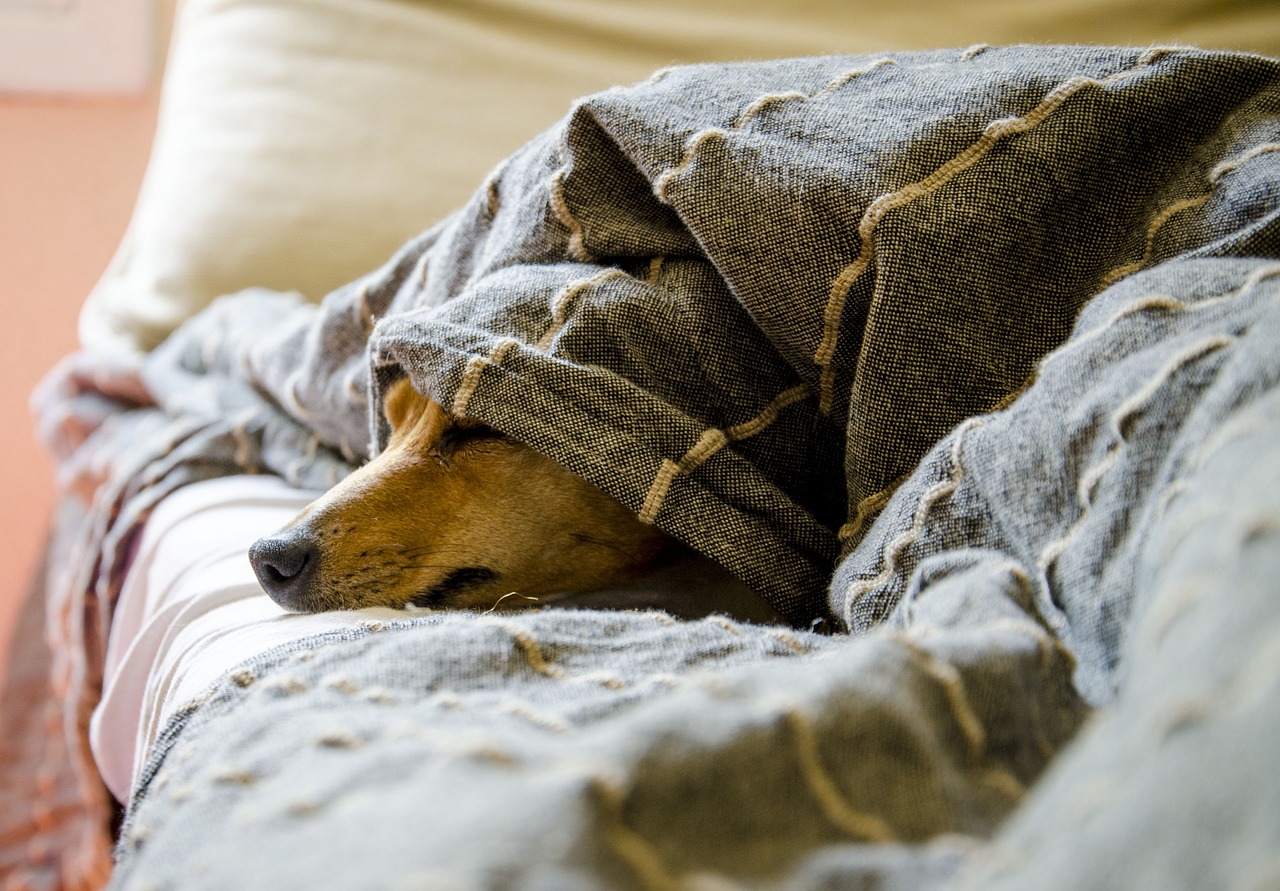
Common Health Issues in Senior Pets
As our beloved furry companions age, they become susceptible to a variety of health issues that can significantly impact their quality of life. Recognizing these common problems is essential for pet owners who want to ensure their senior pets remain happy and healthy. Among the most prevalent health issues in senior pets are arthritis, dental disease, and organ dysfunction.
Arthritis is a degenerative joint disease that affects many older pets, causing pain, stiffness, and decreased mobility. Imagine trying to walk with achy joints after a long day; that’s how your pet might feel! Early detection through regular check-ups can lead to effective pain management strategies, including medications, weight management, and physical therapy.
Another critical issue is dental disease, which often goes unnoticed until it becomes severe. Many pet owners don’t realize that poor dental health can lead to serious systemic problems, including heart and kidney disease. Regular veterinary visits provide the opportunity for dental cleanings and assessments, ensuring that your pet’s mouth remains healthy. A clean mouth is not just about fresh breath; it’s about overall well-being.
Additionally, senior pets are at a higher risk for organ dysfunction, particularly in the liver and kidneys. These organs may not function as efficiently as they once did, leading to a range of health issues. Regular blood tests during check-ups can help monitor organ function and catch any potential problems early. Think of it as a tune-up for your pet’s body; just like a car needs regular maintenance, so do our pets!
In summary, the common health issues faced by senior pets can be managed effectively with regular veterinary check-ups. By staying vigilant and proactive, pet owners can identify problems early and implement necessary treatments. This not only enhances the quality of life for senior pets but also strengthens the bond between pets and their owners.
To better understand these common health issues, here’s a quick overview:
| Health Issue | Symptoms | Preventive Measures |
|---|---|---|
| Arthritis | Pain, stiffness, difficulty in movement | Regular check-ups, weight management, joint supplements |
| Dental Disease | Bad breath, difficulty eating, swollen gums | Routine dental cleanings, dental treats, regular check-ups |
| Organ Dysfunction | Weight loss, lethargy, increased thirst | Regular blood tests, healthy diet, hydration |
Understanding these issues and their implications can help you take better care of your senior pet. Remember, the key to a long and healthy life for your furry friend lies in your hands!
- How often should I take my senior pet to the vet? It's recommended to have check-ups at least twice a year for senior pets to monitor their health closely.
- What signs should I look for that indicate my pet may be unwell? Look for changes in behavior, appetite, weight, and mobility. Any noticeable differences should prompt a visit to the vet.
- Can I manage my senior pet's health issues at home? While some aspects can be managed at home, regular veterinary visits are crucial for professional assessments and treatments.
The Role of Preventive Care
When it comes to our beloved senior pets, preventive care is not just a luxury; it's a necessity. Think of it as a safety net that catches potential health issues before they spiral out of control. Regular veterinary check-ups allow veterinarians to conduct thorough examinations, helping to identify any underlying problems that might not be immediately visible. Just like we humans benefit from routine health screenings, our furry companions need the same attention, especially as they age.
Preventive care encompasses a range of services that can significantly enhance the quality of life for senior pets. During these check-ups, veterinarians can perform blood tests, urinalysis, and other diagnostic procedures that help in early detection of diseases. For instance, conditions such as kidney disease or diabetes can be managed more effectively when caught early. Imagine catching a small leak in your roof before it becomes a waterfall in your living room—that's the power of preventive care!
Moreover, these visits provide an excellent opportunity for pet owners to discuss any behavioral changes they've noticed. Has your once-playful pup become less active? Is your cat suddenly hiding more than usual? These changes can be indicative of health issues, and addressing them early can lead to better outcomes. Regular check-ups not only keep your pet healthy but also foster a deeper bond between you and your veterinarian, who becomes a trusted partner in your pet's care journey.
Preventive care also includes vaccinations and parasite control, which are essential for keeping senior pets safe from preventable diseases. Just because your pet is older doesn’t mean they’re immune to these risks. In fact, older pets can be more vulnerable, making it crucial to stay up-to-date with their vaccinations. Regular check-ups ensure that your pet receives the necessary boosters and treatments to protect them from harmful infections.
To illustrate the importance of preventive care, consider the following table that outlines common preventive measures taken during veterinary check-ups for senior pets:
| Preventive Measure | Description | Frequency |
|---|---|---|
| Comprehensive Physical Exam | A thorough examination of the pet's overall health, checking for any abnormalities. | Every 6-12 months |
| Blood Tests | Tests to check organ function, blood cell counts, and detect diseases early. | Annually or as recommended |
| Vaccinations | Updating necessary vaccinations to protect against infectious diseases. | As per veterinarian's recommendation |
| Dental Check-ups | Assessment of dental health, including cleaning and treatment of any dental issues. | Every 6-12 months |
In conclusion, the role of preventive care in the lives of senior pets cannot be overstated. It serves as a proactive approach to health management, allowing for early detection and intervention for various conditions. By prioritizing regular veterinary check-ups, you are taking a significant step in ensuring that your furry friend enjoys a healthier, happier life in their golden years. Remember, an ounce of prevention is worth a pound of cure!
- How often should I take my senior pet for check-ups? It's generally recommended to take senior pets for check-ups every 6 to 12 months, but consult your veterinarian for personalized advice.
- What should I expect during a senior pet check-up? Expect a comprehensive physical exam, blood tests, and discussions about your pet's behavior and health history.
- Are vaccinations still necessary for senior pets? Yes, vaccinations are crucial for senior pets as they can be more susceptible to diseases.
- Can I manage my senior pet's health at home? While you can monitor their behavior and diet, regular veterinary check-ups are essential for professional assessments and interventions.
Nutritional Needs of Senior Pets
As our beloved furry companions age, their nutritional needs change significantly. Just like humans, senior pets require a diet tailored to their changing bodies and lifestyles. It’s essential to understand that their metabolism slows down, which means they may need fewer calories but higher quality nutrients. This is where the magic of a balanced diet comes into play!
Senior pets often face challenges such as weight management, decreased activity levels, and specific health conditions like arthritis or kidney disease. Therefore, it’s crucial to adjust their diets accordingly. For instance, incorporating high-quality proteins can help maintain muscle mass, while adding fiber can support digestive health. But what does a balanced diet for a senior pet look like? Let’s break it down:
| Nutrient | Importance | Sources |
|---|---|---|
| Proteins | Supports muscle maintenance and repair | Chicken, fish, eggs, and legumes |
| Fiber | Aids in digestion and helps prevent obesity | Vegetables, whole grains, and fruits |
| Omega Fatty Acids | Promotes healthy skin and coat, reduces inflammation | Fish oil, flaxseed oil, and certain nuts |
| Vitamins & Minerals | Supports overall health and immune function | Fruits, vegetables, and fortified pet foods |
Moreover, hydration is often overlooked but is crucial for senior pets. They may not drink as much water as they should, especially if they are on dry food. Ensuring they have access to fresh water at all times is vital. You might also consider adding wet food to their diet, which can increase their fluid intake and provide additional nutrients.
It’s also important to monitor their weight regularly. Overweight pets are at a higher risk for various health issues, including diabetes and joint problems. If you notice your pet gaining a few extra pounds, it might be time to reevaluate their food portions or consider switching to a weight management formula.
Finally, always consult with your veterinarian before making any significant changes to your senior pet's diet. They can provide personalized recommendations based on your pet's specific health needs and lifestyle. Remember, a well-balanced diet is a cornerstone of your pet's health and longevity!
- What are the signs that my senior pet needs a dietary change? Look for changes in weight, energy levels, and overall health. If your pet seems lethargic or is gaining weight, it may be time to adjust their diet.
- Can I feed my senior pet human food? While some human foods are safe for pets, it's best to stick to a diet specifically formulated for them. Consult your vet for safe options.
- How often should I feed my senior pet? Most senior pets do well with two meals a day, but this can vary based on their health and activity level. Check with your veterinarian for tailored advice.
Importance of Vaccinations
When it comes to our beloved senior pets, the importance of vaccinations cannot be overstated. Just like humans, pets can be susceptible to a variety of diseases as they age, and their immune systems may not be as robust as they once were. Keeping vaccinations up-to-date is a crucial part of ensuring that our furry companions remain healthy and protected against preventable diseases. Imagine your pet as a superhero; vaccinations are like their shield against the bad guys lurking in the environment.
As pets grow older, their bodies become less capable of fighting off infections. This makes them more vulnerable to illnesses that can be life-threatening. Regular veterinary check-ups are essential for assessing whether your senior pet is up-to-date on their vaccinations. Some of the key vaccines to consider include:
- Rabies: This is a fatal disease that can affect both pets and humans. It's crucial for all pets, regardless of age.
- Distemper: A highly contagious disease that can lead to severe respiratory and neurological issues.
- Parvovirus: Particularly dangerous for unvaccinated pets, this virus can cause severe gastrointestinal illness.
- Bordetella: This vaccine protects against kennel cough, which can be especially problematic in older pets with weakened immune systems.
Vaccinations not only protect your pet but also contribute to the overall health of the community. By ensuring that your senior pet is vaccinated, you are helping to prevent the spread of diseases that can affect other animals and even humans. It's like being part of a neighborhood watch, but for pet health!
Moreover, keeping a vaccination schedule can help you stay organized and proactive in your pet's health care. Many veterinarians provide a recommended vaccination schedule that is tailored to your pet's age, lifestyle, and health status. This can be a game-changer, especially for senior pets who may have unique health considerations.
In summary, regular vaccinations play a vital role in the health and longevity of senior pets. They help to maintain their quality of life and provide peace of mind for pet owners. So, don't wait for signs of illness; make it a point to discuss your senior pet's vaccination needs with your veterinarian during check-ups. After all, a healthy pet is a happy pet!
Why do senior pets still need vaccinations?
Vaccinations are crucial for senior pets because their immune systems may weaken with age, making them more susceptible to diseases. Staying up-to-date on vaccinations helps protect them from preventable illnesses.
How often should senior pets be vaccinated?
The frequency of vaccinations can vary based on the pet's health, lifestyle, and the specific vaccines. It's best to consult with your veterinarian to create a tailored vaccination schedule for your senior pet.
Are there any risks associated with vaccinating older pets?
While there are some risks, such as mild reactions, the benefits of vaccination generally outweigh the risks. Your veterinarian can assess your pet's health and discuss any concerns you may have regarding vaccinations.
Behavioral Changes and Their Implications
As our beloved pets age, it’s not just their bodies that undergo changes; their behavior can shift dramatically as well. Have you ever noticed your once energetic dog becoming less enthusiastic about playtime or your cat hiding more often? These behavioral changes can be subtle but are often significant indicators of underlying health issues. Just like humans, pets can experience a range of emotions and physical discomforts that can manifest in their behavior.
For example, a senior pet may start to show signs of anxiety or irritability, which can be a response to pain or discomfort. If your furry friend is suddenly reluctant to jump onto the couch or seems to flinch at the slightest touch, it might be time for a check-up. Such changes can be indicative of conditions like arthritis or other joint issues that can cause chronic pain. Understanding these behavioral shifts is crucial for pet owners, as they can guide us in recognizing when our pets need help.
Moreover, some pets may become more clingy or seek more attention due to feelings of insecurity or discomfort. Others might withdraw and spend more time alone, which can be alarming for pet owners who are used to their pets being social. It’s essential to monitor these changes closely, as they can signal health problems that require immediate attention. Regular veterinary check-ups play a vital role here, as veterinarians can assess your pet’s health and offer insights into potential behavioral issues.
Here are a few common behavioral changes to watch for:
- Increased vocalization: If your pet is barking, meowing, or whining more than usual, it may be trying to communicate discomfort or distress.
- Changes in eating habits: A sudden increase or decrease in appetite can indicate health problems, from dental issues to systemic diseases.
- Altered sleeping patterns: Senior pets may sleep more or less than they used to, which can be a sign of various health issues.
By recognizing these changes early, you can work with your veterinarian to develop effective strategies to address any underlying health concerns. Regular check-ups provide an opportunity for vets to evaluate your pet's behavior in conjunction with their physical health, leading to a more comprehensive understanding of their well-being.
In conclusion, understanding the implications of behavioral changes in senior pets is crucial for their overall health. By staying observant and proactive, you can ensure that your furry companions receive the care they need to maintain their quality of life as they age.
Q: What should I do if I notice behavioral changes in my senior pet?
A: If you notice any significant changes in your pet's behavior, it’s best to consult your veterinarian. They can help determine if there are underlying health issues that need to be addressed.
Q: How often should senior pets have check-ups?
A: Senior pets should ideally have veterinary check-ups at least twice a year. This allows for early detection of potential health problems.
Q: Can behavioral changes be related to pain?
A: Yes, many behavioral changes in senior pets can be attributed to pain or discomfort, especially if they are reluctant to engage in activities they once enjoyed.
Q: What are some signs that my pet may be in pain?
A: Signs of pain in pets can include vocalization, changes in appetite, withdrawal from social interaction, and reluctance to move or play.

Monitoring Chronic Conditions
As our beloved pets age, many of them face the reality of chronic conditions that can affect their quality of life. Just like humans, pets can develop ongoing health issues that require consistent attention and management. Regular veterinary visits play a crucial role in monitoring these conditions, allowing for timely adjustments in treatment and care. Imagine your pet as a fine-tuned machine; over time, certain parts may start to wear down or malfunction. If you don't keep an eye on those parts, the entire machine may eventually break down. That's why understanding and monitoring chronic conditions in senior pets is vital.
Chronic conditions can range from arthritis and diabetes to kidney disease and heart issues. Each of these conditions presents its own set of challenges, and the symptoms can often be subtle. For instance, your dog may not jump as high as he used to, or your cat may be less interested in playtime. These changes can sometimes be brushed off as normal aging, but they can also be red flags indicating a more serious underlying issue. Regular check-ups allow veterinarians to perform necessary tests, such as blood work or X-rays, to monitor these conditions effectively.
One of the significant benefits of regular check-ups is the ability to track the progression of chronic diseases. By keeping detailed records of your pet’s health, veterinarians can identify patterns and make informed decisions about treatment adjustments. For example, if your pet has been diagnosed with diabetes, regular visits can help monitor blood glucose levels and adjust insulin dosages as needed. This proactive approach can prevent complications and ensure your pet remains as comfortable and healthy as possible.
Moreover, these visits provide an opportunity for pet owners to discuss any behavioral changes they may have noticed. Is your pet drinking more water than usual? Have they become less active? These observations are critical and can provide valuable insights into your pet's health status. Your veterinarian can then recommend appropriate interventions or lifestyle changes that can help manage these chronic conditions effectively.
It’s also essential to remember that monitoring chronic conditions isn’t just about physical health; it also encompasses emotional well-being. Senior pets can experience anxiety or depression due to chronic pain or changes in their routine. Regular veterinary visits can help address these concerns, ensuring that your pet receives a holistic approach to their care. This might include behavioral therapies, changes in diet, or even medications to help manage anxiety.
In summary, monitoring chronic conditions in senior pets is a multifaceted approach that requires diligence and regular veterinary check-ups. By staying proactive and attentive, you can make a world of difference in your pet’s quality of life. Just think of it as being the captain of a ship; you need to navigate through the waters carefully, adjusting your course as needed to ensure a smooth journey. Your senior pet deserves nothing less than a comfortable and happy life, and regular check-ups are the compass that can guide you both.
- How often should senior pets have check-ups? It's generally recommended that senior pets visit the veterinarian every six months for a thorough check-up.
- What are some signs that my pet may have a chronic condition? Look for changes in behavior, appetite, weight, energy levels, or bathroom habits.
- Can chronic conditions in pets be managed effectively? Yes, with regular veterinary care and appropriate treatment plans, many chronic conditions can be managed successfully, improving your pet's quality of life.
Importance of Dental Health
When it comes to the health of our beloved senior pets, dental health is often an overlooked aspect that can significantly impact their overall well-being. Just like humans, pets can suffer from a plethora of dental issues, and these problems can escalate quickly if not addressed. Imagine your pet struggling to eat or experiencing chronic pain—it's a heartbreaking scenario that can be easily avoided with regular dental check-ups.
As pets age, their teeth and gums become more susceptible to plaque and tartar buildup, leading to conditions such as gingivitis and periodontal disease. These issues not only cause discomfort but can also lead to more severe health problems, including infections that may affect the heart, liver, and kidneys. Therefore, maintaining dental hygiene is crucial for prolonging your pet's life and ensuring they remain happy and active.
Regular veterinary visits often include a thorough dental examination. During these check-ups, veterinarians can identify early signs of dental disease and recommend appropriate treatments. This can range from professional cleanings to more advanced procedures, depending on the severity of the issue. It's essential to remember that prevention is always better than cure. By investing in your senior pet's dental health now, you can save them from painful procedures and complications down the line.
So, what can you do as a responsible pet owner? Here are some simple yet effective practices:
- Regular Teeth Brushing: Aim to brush your pet's teeth at least a few times a week. Use toothpaste specifically designed for pets, as human toothpaste can be harmful.
- Dental Chews: Provide dental treats or chews that help reduce plaque and tartar buildup. These can be a fun way for your pet to maintain their dental hygiene.
- Professional Cleanings: Schedule regular professional dental cleanings with your veterinarian. This is essential for senior pets, as they may require more frequent cleanings than younger animals.
In conclusion, prioritizing your senior pet's dental health is not just about keeping their teeth clean; it's about enhancing their quality of life. By staying proactive and working closely with your veterinarian, you can ensure that your furry friend enjoys their golden years without the burden of dental pain or disease.
Q: How often should I take my senior pet for dental check-ups?
A: It's recommended to have your senior pet's dental health evaluated at least once a year, but some pets may need more frequent visits depending on their specific needs.
Q: Can I brush my pet's teeth every day?
A: Yes, daily brushing is ideal and can significantly improve your pet's dental health. If daily brushing isn't feasible, aim for at least a few times a week.
Q: Are dental treats effective?
A: While dental treats can help reduce plaque and tartar, they should not replace regular brushing and professional cleanings. They are best used as a supplement to a comprehensive dental care routine.
Creating a Comprehensive Care Plan
Creating a comprehensive care plan for your senior pet is like crafting a tailored suit; it needs to fit perfectly to ensure comfort and functionality. Just as we humans benefit from personalized health plans, our furry companions deserve the same level of attention and customization. This plan should encompass various aspects of their health, including diet, exercise, preventive care, and regular veterinary visits. By addressing these areas, you can significantly enhance your pet's quality of life.
First and foremost, it’s essential to consider your pet's unique health status. Each pet is different, and their needs will vary based on factors such as breed, age, and existing health conditions. For instance, if your dog has arthritis, their exercise routine will need to be adjusted to avoid strain on their joints. A comprehensive care plan should include:
- Regular health assessments: Schedule check-ups at least twice a year to monitor your pet's health and adapt the care plan as needed.
- Dietary adjustments: Consult with your veterinarian to determine the best diet that meets the changing nutritional needs of your senior pet.
- Exercise routines: Tailor exercise regimens to accommodate any physical limitations while still promoting mobility and engagement.
Furthermore, incorporating preventive care measures is crucial. Regular vaccinations and screenings can catch potential health issues before they escalate. For example, dental health is often overlooked, yet it plays a significant role in overall well-being. Your care plan should include:
| Preventive Care Aspect | Frequency |
|---|---|
| Veterinary Check-ups | Every 6 months |
| Dental Cleanings | Annually or as recommended |
| Vaccinations | As per vet recommendation |
Additionally, it’s vital to keep an eye on any behavioral changes. If your pet starts acting differently—perhaps they’re less social or seem to be in pain—this could indicate underlying health issues. Regular check-ups provide veterinarians the opportunity to assess these changes and recommend appropriate interventions.
Finally, remember that a care plan is not static; it should evolve as your pet ages. Just like us, pets have different needs at different stages of life. Regular communication with your veterinarian will ensure that you’re always on the right track, making adjustments to the care plan as needed. This proactive approach can lead to a happier, healthier life for your beloved senior pet.
- How often should I take my senior pet to the vet? It's recommended to schedule check-ups at least twice a year for senior pets.
- What dietary changes should I consider for my aging pet? Consult with your veterinarian to develop a diet that meets your pet's specific nutritional needs.
- Are vaccinations still important for senior pets? Yes, keeping vaccinations up-to-date is crucial to protect against preventable diseases.
Frequently Asked Questions
- Why are regular check-ups important for senior pets?
Regular check-ups are crucial for senior pets because they help detect health issues early. As pets age, they become more susceptible to various conditions, and routine visits allow veterinarians to monitor their health, recommend preventive measures, and adjust treatments as needed. This proactive approach can significantly enhance your pet's quality of life.
- What common health issues should I watch for in senior pets?
Senior pets often face several health challenges, including arthritis, dental disease, and organ dysfunction. Being aware of these common issues allows you to seek veterinary care sooner, which can lead to better management and improved overall well-being for your furry friend.
- How can I support my senior pet's nutritional needs?
As pets age, their nutritional requirements change significantly. It's essential to provide a balanced diet that caters to their specific needs, which may include lower calories, higher fiber, and added supplements for joint health. Consulting your veterinarian about the best diet for your senior pet is a great way to ensure they stay healthy and energetic.
- Are vaccinations still necessary for senior pets?
Absolutely! Vaccinations remain vital for senior pets, as older animals can be more vulnerable to severe diseases. Regular check-ups ensure that your pet is up-to-date on their vaccinations, providing protection against preventable illnesses that can significantly affect their health.
- What behavioral changes should I be aware of in my senior pet?
Behavioral changes in senior pets can be indicators of underlying health issues. Signs such as increased aggression, withdrawal, or changes in appetite may signal that something is wrong. Regular veterinary check-ups allow for a thorough assessment of these changes and can lead to appropriate interventions or treatments.
- How can I monitor my senior pet's chronic conditions?
Monitoring chronic conditions in senior pets requires regular veterinary visits. These appointments enable your vet to track the progression of any existing health issues, adjust treatment plans accordingly, and ensure that your pet enjoys a good quality of life despite their conditions.
- Why is dental health important for senior pets?
Dental health is crucial for senior pets, as poor oral hygiene can lead to serious health problems, including infections and organ dysfunction. Regular check-ups allow veterinarians to assess your pet's dental health and recommend cleanings or treatments to maintain their overall well-being.
- How can I create a comprehensive care plan for my senior pet?
Creating a comprehensive care plan for your senior pet involves understanding their specific health needs and regularly updating this plan based on their condition. Regular veterinary check-ups provide the opportunity to develop and adjust this care plan, ensuring your pet receives the best possible support as they age.

